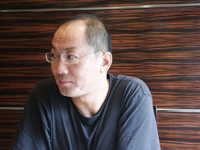








 |
|
陳光興
清華大學外語系教授,亞太/文化研究室召集人
|
| 個人簡介 |
|
陳光興是臺灣清華大學教授,目前在新加坡國立大學任資深訪問研究員。他是臺灣社會研究季刊的成員,也是Inter-Asia Cultural Studies: Movements國際期刊及書系的執行主編。
Kuan-Hsing Chen is Professor of Cultural Studies in the Center for Asia-Pacific/ Cultural Studies, National Tsing Hua University, Taiwan, and is currently a visiting senior research fellow at the Asia Research Institute, National University of Singapore. He has held visiting professorships at universities in Korea, China, Japan, Singapore and the U.S. He has published extensively in both Chinese and English, including edited volumes in English: Stuart Hall: Critical Dialogues in Cultural Studies (1996) and Trajectories: Inter-Asia Cultural Studies (1998); and in Chinese: Cultural Studies in Taiwan (2000) and The Partha Chatterjee Seminar--Locating Political Society: Modernity, State Violence and Postcolonial Democracies (2000). His own books include Media/Cultural Criticism: A Popular-Democratic Line of Flight (1992, in Chinese), and The Imperialist Eye (2003, in Korean). An active intellectual, he has organized and participated in many local, regional and international events. His writings have been frequently translated and published in Korea, China and Japan. He was founding president of the Cultural Studies Association, Taiwan, and is on the board of the (international) Association for Cultural Studies. A core member of the Taiwan: A Radical Quarterly in Social Studies, he is a co-executive editor of the journal and books series of Inter-Asia Cultural Studies: Movements.
|
| 課程簡介 |
|
Problematic and Problems of teaching cultural studies in Taiwan
Presumably, unlike other 「disciplines」, cultural studies has moved away from a pretentious universalism to position its intellectual practice as 「locally」 and historically grounded. The same is true for teaching cultural studies.
My presentation is a critical reflection on my own experiences of teaching cultural studies in Taiwan since 1989. In the early part of my teaching career, contemporary 「critical theories」 were the main ingredients of the curriculum. This un-reflexive nature of teaching, like of the teachers did in that era, was soon challenged by the necessary desire to move on. Two sets of materials for teaching have then begun to emerge since mid 1990s. The first was to introduce students to the 「cultural studies」 writings produced in Taiwan (and sometimes including other Chinese speaking contexts); the intent was that they could inherit problematic formulated in their teachers』 generation, and then through critiques to move forward in their own work. The second was to fill in a vacuum in the larger contexts of teaching cultural studies in Taiwan, by bringing in cultural studies writings produced in Asia, so that the referent points of can be multiplied beyond the obsession with the West. International seminars were organized for students to directly encounter the authors they read. This attempt has been a rather lonely task.
Because of the new institutional demand in the College of Humanities and Social Sciences, National Tsing Hua University, to produce degree programs on both undergraduate and graduate level, the attempt at the next step is to incorporate the curriculum mentioned above with a re-searching for intellectual thoughts and sources for cultural studies back to the early 20 century onward. In the end, teaching cultural studies in Taiwan would look like an intellectual history of critical sources, composed of 1) early Chinese cultural criticism writings such as Lu
Xun, continued by writers such as Chen Yingzhen, 2) the popular cultural criticism of the 1980s and 1990s produced in Taiwan, 3) Birmingham centered cultural studies tradition and critical theory, 4) contemporary cultural studies writings produced in different Chinese speaking contexts, 5) Inter-Asia Cultural Studies writings.
|
|

